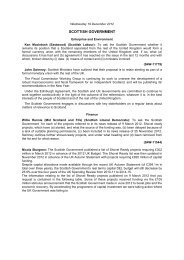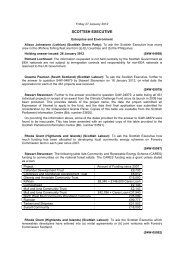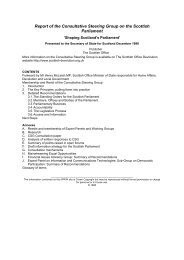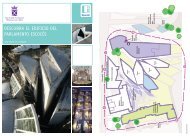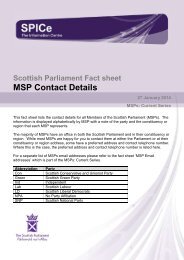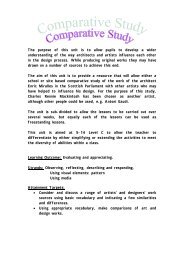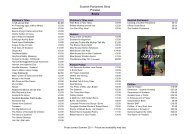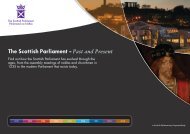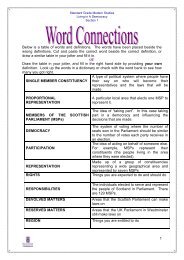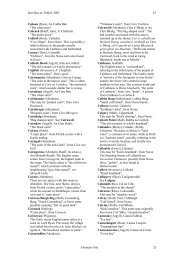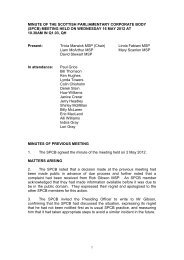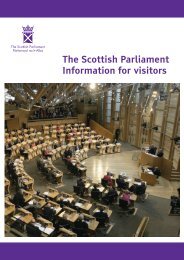Summary of consultation responses - Scottish Parliament
Summary of consultation responses - Scottish Parliament
Summary of consultation responses - Scottish Parliament
Create successful ePaper yourself
Turn your PDF publications into a flip-book with our unique Google optimized e-Paper software.
BRITISH SIGN LANGUAGE (SCOTLAND) BILL – MARK GRIFFIN MSP<br />
SUMMARY OF CONSULTATION RESPONSES<br />
This document summarises and analyses the <strong>responses</strong> to a <strong>consultation</strong> exercise<br />
carried out on the above proposal.<br />
The background to the proposal is set out in section 1, while section 2 gives an<br />
overview <strong>of</strong> the results. A detailed analysis <strong>of</strong> the <strong>responses</strong> to the <strong>consultation</strong><br />
questions is given in section 3. These three sections have been prepared by the<br />
<strong>Scottish</strong> <strong>Parliament</strong>’s Non-Government Bills Unit (NGBU). Section 4 has been<br />
prepared by Mark Griffin MSP and includes his commentary on the results <strong>of</strong> the<br />
<strong>consultation</strong>.<br />
Where respondents have requested that certain information be treated as<br />
confidential, or that the response remain anonymous, these requests have been<br />
respected in this summary.<br />
In some places, the summary includes quantitative data about <strong>responses</strong>, including<br />
numbers and proportions <strong>of</strong> respondents who have indicated support for, or<br />
opposition to, the proposal (or particular aspects <strong>of</strong> it). In interpreting this data, it<br />
should be borne in mind that respondents are self-selecting and it should not be<br />
assumed that their individual or collective views are representative <strong>of</strong> wider<br />
stakeholder or public opinion. The principal aim <strong>of</strong> the document is to identify the<br />
main points made by respondents, giving weight in particular to those supported by<br />
arguments and evidence and those from respondents with relevant experience and<br />
expertise. A <strong>consultation</strong> is not an opinion poll, and the best arguments may not be<br />
those that obtain majority support.<br />
Copies <strong>of</strong> the individual <strong>responses</strong> are available on the following website<br />
http://www.markgriffinmsp.org.uk/content/bsl-bill/. Responses have been<br />
numbered for ease <strong>of</strong> reference, and the relevant number is included in brackets<br />
after the name <strong>of</strong> the respondent.<br />
A list <strong>of</strong> respondents is set out in the Annexes<br />
<br />
<br />
Annexe A – numbered as received<br />
Annexe B – in alphabetical order.<br />
1
CONTENTS<br />
SECTION 1: INTRODUCTION AND BACKGROUND ............................................... 3<br />
SECTION 2: OVERVIEW OF RESPONSES .............................................................. 4<br />
SECTION 3 – ANALYSIS OF RESPONSES TO CONSULTATION QUESTIONS ..... 7<br />
Question 1 – General aim <strong>of</strong> the proposed Bill ....................................................... 7<br />
Question 2 – The need for legislation ..................................................................... 9<br />
Question 3 – Benefits and challenges .................................................................. 12<br />
Question 4 – Specific action to promote BSL ....................................................... 14<br />
Question 5 – Improving awareness <strong>of</strong> the case for access to free BSL classes for<br />
deaf children and their families ............................................................................. 15<br />
Question 6 - Designated <strong>Scottish</strong> Minister ............................................................ 17<br />
Question 7 – Advisory Board ................................................................................ 19<br />
Question 8 – Relevant public authorities BSL action plans ................................... 21<br />
Question 9 – Financial implications ...................................................................... 22<br />
Question 10 – Impact on equality and diversity .................................................... 23<br />
Question 11 – Any other comments or suggestions ............................................. 24<br />
SECTION 4 – COMMENTARY BY MARK GRIFFIN MSP ....................................... 27<br />
Annexe A – Respondents, numbered as received ................................................... 28<br />
Annexe B – Respondents, alphabetical order .......................................................... 32<br />
2
SECTION 1: INTRODUCTION AND BACKGROUND<br />
Mark Griffin’s draft proposal, lodged on 27 July 2012, is for a Bill to:<br />
Promote the use <strong>of</strong> British Sign Language (BSL) by requiring the <strong>Scottish</strong><br />
Ministers and relevant public authorities to prepare and publish BSL plans.<br />
The proposal was accompanied by a <strong>consultation</strong> document, prepared with the<br />
assistance <strong>of</strong> NGBU. This document was published on the <strong>Parliament</strong>’s website,<br />
from where it remains accessible:<br />
http://www.scottish.parliament.uk/parliamentarybusiness/Bills/29731.aspx.<br />
The <strong>consultation</strong> period ran from 27 July to 31 October 2012, and was subsequently<br />
extended by the member to 7 November 2012.<br />
The <strong>consultation</strong> period was marked by an <strong>of</strong>ficial launch on Monday 30 July in the<br />
<strong>Scottish</strong> <strong>Parliament</strong>. This was advertised in the national and local press. All public<br />
authorities in Scotland were lettered or emailed, with a copy <strong>of</strong> the <strong>consultation</strong><br />
document enclosed. A number <strong>of</strong> charities – in particular charities with a link to<br />
Deafness, disabilities and equality – were informed also. In addition to the publicity in<br />
local and national newspapers, Deaf organisations represented on the Cross Party<br />
Group on Deafness, publicized the Bill on their respective websites and in<br />
newsletters.<br />
The <strong>consultation</strong> exercise was run by Mark Griffin’s parliamentary <strong>of</strong>fice.<br />
The <strong>consultation</strong> process is part <strong>of</strong> the procedure that MSPs must follow in order to<br />
obtain the right to introduce a Member’s Bill. Further information about the<br />
procedure can be found in the <strong>Parliament</strong>’s standing orders (see Rule 9.14) and in<br />
the Guidance on Public Bills, both <strong>of</strong> which are available on the <strong>Parliament</strong>’s<br />
website:<br />
Standing orders (Chapter 9):<br />
http://www.scottish.parliament.uk/parliamentarybusiness/26514.aspx<br />
Guidance (Part 3):<br />
http://www.scottish.parliament.uk/parliamentarybusiness/Bills/25690.aspx<br />
3
SECTION 2: OVERVIEW OF RESPONSES<br />
In total, 222 <strong>responses</strong> were received. This total was made up <strong>of</strong> 49 <strong>responses</strong> from<br />
organisations 1 , 172 from individuals (including 39 anonymous <strong>responses</strong> enclosed<br />
with the submission from “Sign and Be Heard” (SABH) 2 , and one petition 3 with 937<br />
signatures. It should be noted that 76 <strong>of</strong> the individual <strong>responses</strong> contained wording<br />
in similar terms. 4<br />
The <strong>responses</strong> can be categorised as follows:<br />
14 (6%) from public sector bodies and organisations (including 3 health<br />
boards/related bodies and 11 local authorities);<br />
20 (9%) from representative/membership bodies (including voluntary sector<br />
organisations, campaign groups, a trades union body, a police association<br />
and support service providers);<br />
11 (5%) from charities;<br />
3 (1%) from organisations representing children and young people’s interests;<br />
1 from an education provider;<br />
1 petition (with 937 expressions <strong>of</strong> support);<br />
171 (77%) from private individuals (members <strong>of</strong> the public)<br />
1 MP (as an individual).<br />
Twenty-four <strong>of</strong> the <strong>responses</strong> from organisations had some connection with deaf,<br />
deafblind or hard <strong>of</strong> hearing people through, for example, being representative or<br />
membership organisations, providing support, training or other services, or having a<br />
1 Responses from organisations 30 – 32 were identical, but have been logged separately as they<br />
were submitted by different sub-groups from within a larger organisation.<br />
2 The 39 submissions from SABH have been treated as individual <strong>responses</strong>.<br />
3 The petition has been treated as one submission and its terms were as follows: “We, the<br />
undersigned, support the general aim <strong>of</strong> the Proposed BSL Bill (Scotland) because we would like to<br />
see the aim extended to include the cultural aspects <strong>of</strong> BSL and the Deaf Community in a similar way<br />
to that <strong>of</strong> Gaelic. We would also like the aim to be extended to include a better awareness not only <strong>of</strong><br />
the language among the hearing population, but also an awareness <strong>of</strong> the rich culture and history <strong>of</strong><br />
the Deaf Community in Scotland. We would want to see a firm commitment in the Bill to include Deaf<br />
people as advisers to the <strong>Scottish</strong> Government so that they are at the heart <strong>of</strong> the Bill as it is their<br />
language. There should be a BSL Board like Gaelic speakers have and the Board should have a<br />
majority <strong>of</strong> Deaf BSL users on it. The legislation should be designed to promote the use <strong>of</strong> BSL,<br />
secure the status <strong>of</strong> the language and ensure its long-term future.”<br />
4 The terms <strong>of</strong> the 76 <strong>responses</strong> included the following wording: “I support the general aim <strong>of</strong> the<br />
proposed Bill, but would like to see the aim extended to include a better awareness not only <strong>of</strong> the<br />
language among the hearing population, but also an awareness <strong>of</strong> the rich culture and history <strong>of</strong> the<br />
Deaf Community in Scotland. I want to see a firm commitment in the Bill to include Deaf people as<br />
advisers to the <strong>Scottish</strong> Government so that they are at the heart <strong>of</strong> the Bill as it is their language. I<br />
want there to be a BSL Board like Gaelic speakers have and I want the Board to have a majority <strong>of</strong><br />
Deaf BSL users on it.”<br />
4
campaigning role. (The use <strong>of</strong> upper or lower case in “Deaf/deaf” is consistent with<br />
the use by the respondent where comments have been attributed.)<br />
One anonymous individual response (in addition to those submitted under cover <strong>of</strong><br />
SABH) and one confidential response were also received.<br />
There was a substantial overall majority <strong>of</strong> support from respondents for the aims <strong>of</strong><br />
the proposed Bill to promote the use <strong>of</strong> BSL and raise awareness <strong>of</strong> the language.<br />
There was also majority agreement that legislation was required and was the<br />
appropriate mechanism to meet those aims.<br />
A minority view was that legislation was not required if deafness was considered to<br />
be a protected characteristic in terms <strong>of</strong> the Equality Act 2010, and that there was<br />
already legislative drive for BSL to be promoted through the disability provisions <strong>of</strong><br />
that Act. However, it was countered that “other people whose first language is a<br />
spoken language other than English do not have to declare themselves “disabled” in<br />
order to access services and information in their language” (<strong>Scottish</strong> Council on<br />
Deafness). A number <strong>of</strong> other alternatives to legislation (such as the development <strong>of</strong><br />
a national strategy, were also suggested.<br />
In terms <strong>of</strong> whether there was a case for specific action to promote BSL as opposed<br />
to other minority languages, those supporting the case argued, amongst other<br />
things, that BSL was a language under threat and that BSL users might not have<br />
access to a spoken language. Against this, others argued that, by legislating for a<br />
specific group, attention and resources might be directed away from other<br />
disadvantaged groups, languages or forms <strong>of</strong> communication, or that there might be<br />
an equally pressing need to promote other means <strong>of</strong> communication.<br />
A strong theme was that the general aims <strong>of</strong> the proposed Bill should be extended to<br />
include the promotion <strong>of</strong> the cultural aspects <strong>of</strong> BSL and an analogy was drawn with<br />
treatment <strong>of</strong> Gaelic since the implementation <strong>of</strong> the Gaelic Language (Scotland) Act<br />
2005.<br />
Possible indirect benefits <strong>of</strong> increased awareness were also highlighted, such as<br />
improved access for BSL users to services and information, as well as improved<br />
consistency across public bodies. In terms <strong>of</strong> the proposed Bill increasing<br />
awareness <strong>of</strong> the case for access to free BSL classes for deaf children and their<br />
families, there was broad agreement that this would be the case and strong<br />
arguments for the provision <strong>of</strong> this service were also detailed.<br />
In terms <strong>of</strong> basing the proposed Bill largely on the model <strong>of</strong> the Gaelic Language<br />
(Scotland) Act 2005 by including a strategy for promoting the use <strong>of</strong> a language,<br />
most respondents felt that there should be a specific <strong>Scottish</strong> Minister designated<br />
with that responsibility and that, most appropriately, it should be the Minister for<br />
Learning, Science and Scotland’s Languages under the Cabinet Secretary for<br />
Education and Lifelong Learning, although a number also felt that it should fall to all<br />
Ministers who had responsibility to ensure that such work was integral to all<br />
Government departments in line with the public sector equality duty.<br />
5
There was general support for the establishment <strong>of</strong> an Advisory Board to advise the<br />
designated Minister(s) and strong arguments were made for the majority <strong>of</strong><br />
membership being BSL users, although others argued for the benefits <strong>of</strong> a broader<br />
membership or for the inclusion <strong>of</strong> other forms <strong>of</strong> communications or equality groups<br />
on such a Board.<br />
6
SECTION 3 – ANALYSIS OF RESPONSES TO CONSULTATION QUESTIONS<br />
Purpose <strong>of</strong> the proposed Bill<br />
The proposed Bill would encourage the use <strong>of</strong> BSL in <strong>Scottish</strong> public life and raise<br />
awareness <strong>of</strong> the language among the hearing population by requiring—<br />
<br />
The <strong>Scottish</strong> Government to create a designated, or lead, Minister for BSL.<br />
The <strong>Scottish</strong> Ministers to develop a <strong>Scottish</strong> Government BSL strategic plan<br />
detailing what action the Government is taking and plans to take to promote<br />
BSL within areas <strong>of</strong> its responsibility.<br />
“Relevant public authorities” to produce action plans to be published by these<br />
authorities and submitted to the <strong>Scottish</strong> Ministers.<br />
The <strong>Scottish</strong> Ministers to report to the <strong>Scottish</strong> <strong>Parliament</strong> at least twice in a<br />
<strong>Parliament</strong>ary session on the content <strong>of</strong> their strategic plan and on the<br />
performance <strong>of</strong> the public authorities in terms <strong>of</strong> their BSL action plans. (In<br />
practice, during the first half <strong>of</strong> a parliamentary session, <strong>Scottish</strong> Ministers<br />
would prepare and publish their strategic plan and guidance, which would be<br />
laid before the <strong>Scottish</strong> <strong>Parliament</strong>. In the second half <strong>of</strong> the parliamentary<br />
session, the <strong>Scottish</strong> Ministers would report to the <strong>Scottish</strong> <strong>Parliament</strong> on how<br />
they were performing in relation to the strategic plan; the report would include<br />
details <strong>of</strong> the relevant authorities’ plans and performance).<br />
Question 1 – General aim <strong>of</strong> the proposed Bill<br />
Question 1<br />
Do you support the general aim <strong>of</strong> the proposed BSL Bill? Please indicate<br />
“yes/no/undecided” and explain the reasons for your response.<br />
One hundred and fifty-two respondents answered this question, including 42<br />
organisations and 110 individuals. Of those, 148 (97%) were supportive <strong>of</strong> the aims<br />
<strong>of</strong> the proposed Bill and two (1.5%) were opposed. The remaining two (1.5%)<br />
respondents had either mixed or other views.<br />
There was a general overlap in <strong>responses</strong> to this question and Question 2, which<br />
sought views on the need for legislation – these two sections <strong>of</strong> the summary should<br />
be considered together.<br />
Reasons for supporting the aims <strong>of</strong> the proposal related to benefits (direct and<br />
indirect) – such as assisting in the promotion <strong>of</strong> inclusion, the importance <strong>of</strong> the<br />
cultural aspects <strong>of</strong> BSL, increasing access to services where interpreters were<br />
required, and improving communication and the need for learning BSL to be more<br />
easily available. Where these issues are addressed in substantive <strong>responses</strong> to<br />
other questions in the <strong>consultation</strong>, they are not expanded on at length here.<br />
7
Recognition <strong>of</strong> BSL as an indigenous language<br />
A strong theme throughout a significant number <strong>of</strong> <strong>responses</strong> was that BSL should<br />
be recognised as an indigenous language: in support <strong>of</strong> this contention, Deaf Action<br />
provided examples <strong>of</strong> countries which had formalised recognition <strong>of</strong> their indigenous<br />
sign language within their legal structures and referred to UN instruments such as<br />
the Declaration on the Rights <strong>of</strong> the Persons Belonging to National or Ethnic,<br />
Religious and Linguistic Minorities, which recognised the need for linguistic<br />
protection. The organisation “Signature” argued that: “BSL, the language <strong>of</strong> Deaf<br />
people, is the fourth indigenous language <strong>of</strong> Scotland”.<br />
In addition, it was argued that learning BSL—<br />
could provide a second language to emphasise meanings;<br />
improve general communication skills;<br />
should be seen as significant as learning a foreign language;<br />
in the context <strong>of</strong> the shortage <strong>of</strong> interpreters, might make people more aware<br />
<strong>of</strong> possible job opportunities for people using BSL.<br />
Cultural aspects <strong>of</strong> the language<br />
Twenty-two organisations referred to the cultural aspects <strong>of</strong> BSL, indicating a wish to<br />
see it as a language in its own right similar to Gaelic. The <strong>Scottish</strong> Council on<br />
Deafness (SCoD), for example, believed that the general aim should be extended to<br />
include the promotion <strong>of</strong> the cultural aspects <strong>of</strong> BSL and the Deaf community’s<br />
history similar to Gaelic language and speakers.<br />
A significant number <strong>of</strong> individual respondents (76, in addition to those signatories to<br />
the petition), while not answering the question specifically, provided a general<br />
comment that they supported the general aim <strong>of</strong> the proposed Bill, but would like to<br />
see the aim extended “to include [amongst other things] a better awareness not only<br />
<strong>of</strong> the language among the hearing population, but also an awareness <strong>of</strong> the rich<br />
culture and history <strong>of</strong> the Deaf Community in Scotland”.<br />
Accessing services and information<br />
Respondents highlighted that implementation <strong>of</strong> the proposal, by increasing<br />
awareness <strong>of</strong> BSL, might lead to improved communication and consequently access<br />
to services and information. Capability Scotland, for example, referred to examples<br />
<strong>of</strong> areas in which, they believed, BSL users appeared to be discriminated against,<br />
including housing, health, social care, justice and legal services. Further, Inclusion<br />
Scotland stated that: “It is common for service users who are BSL users to have<br />
negative experiences <strong>of</strong> services or not to get access to information that is crucial to<br />
them accessing essential services due to their communications requirements …<br />
[which can put up barriers] to independent living, but can also breach Deaf people’s<br />
Article 8 right to a private life”.<br />
Three organisations (British Deaf Association Scotland, Self Directed Support<br />
Scotland and Inclusion Scotland) cited further evidence <strong>of</strong> communication barriers<br />
that could be experienced in accessing services—<br />
8
“Recent research from a consortium <strong>of</strong> seven organisations including the BDA<br />
shows that Deaf people have problems when they go to hospital or the GP.<br />
Out <strong>of</strong> 305 Deaf people, 84% <strong>of</strong> respondents reported they did not have<br />
access to a sign language interpreter. 68% asked for [an interpreter] for an<br />
appointment with the GP, but did not get one. Even with one, 36% made a<br />
complaint because they could not understand the interpreter”.<br />
A note <strong>of</strong> caution was sounded by Capability Scotland who felt that, while failure to<br />
meet the communication needs <strong>of</strong> BSL users could put them at a disadvantage in<br />
relation to accessing goods and services which, “in some cases, were likely to<br />
constitute a violation <strong>of</strong> the Equality Act 2010”, it was essential that steps were taken<br />
to implement the duties <strong>of</strong> that Act before new legislation was introduced and that<br />
proper consideration should be given to potential overlap between the proposed Bill<br />
and existing equality law.<br />
Rights <strong>of</strong> the child<br />
In providing their explanation for supporting the general aims <strong>of</strong> the proposed Bill,<br />
the National Deaf Children’s Society (NDCS) and Scotland’s Commissioner for<br />
Children and Young People (SCCYP) referred, amongst other things, to Article 29(a)<br />
<strong>of</strong> the UN Convention on the Rights <strong>of</strong> the Child: “the development <strong>of</strong> respect for the<br />
child’s parents, his or her own cultural identity, language and values”. In addition,<br />
SCCYP referred to Articles 30 and 31, on the rights <strong>of</strong> linguistic minorities.<br />
Question 2 – The need for legislation<br />
Question 2<br />
Do you believe legislation is required? If not, what other non-legislative means<br />
can be followed?<br />
One hundred and fifty respondents provided a direct response to this question,<br />
including 42 organisations and 108 individuals. Of those, 133 (89%) expressed the<br />
view that legislation was required, and 17 (11%) were either opposed to some<br />
degree, or had mixed or other views (such as being supportive <strong>of</strong> the aims <strong>of</strong> the<br />
proposal but not the need for legislation, or preferring the option <strong>of</strong> making use <strong>of</strong><br />
existing legislation).<br />
Those supporting the need for new legislation were generally <strong>of</strong> the view that<br />
BSL users should be classed as a linguistic minority, with BSL being treated as “a<br />
language and not an additional communication support need and requires clear and<br />
distinct legislative powers for its preservation and promotion to ensure the equality <strong>of</strong><br />
Deaf people in Scotland” (British Deaf Association). This view was held by the<br />
majority <strong>of</strong> individuals who responded to this question and a number <strong>of</strong><br />
organisations, illustrated by the following—<br />
The <strong>Scottish</strong> Council on Deafness (SCoD) felt that there was no legislation<br />
supporting BSL as a language in its own right and BSL users as members <strong>of</strong><br />
a linguistic minority and that: “… Since other people whose first language is a<br />
9
spoken language other than English do not have to declare themselves<br />
“disabled” in order to access services and information in their language, why<br />
should Deaf BSL users? For as long as this is the case, there is no equality<br />
for Deaf BSL users, only discrimination”.<br />
The British Deaf Association believed that non-legislative means had not<br />
worked and that “the Equality Act only covers Deaf people if they declare<br />
themselves to be disabled. To access services and information in one’s own<br />
language should not be covered by “protected characteristic” <strong>of</strong> disability …<br />
this is an anomaly that requires legislation to clarify”.<br />
The STUC stated that: “Not all deaf people identify themselves as being<br />
disabled and therefore lose the protection afforded under the [2010] Act”.<br />
One individual respondent felt that it was “highly questionable” to consider a<br />
deaf BSL user to be covered by the Equality Act 2010, noting that this meant<br />
that an individual who uses BSL as their first language was to be considered<br />
“disabled” and did not reflect an “equal standing”, as speakers <strong>of</strong>, for example,<br />
Polish, Urdu, Chinese or Gaelic would not be considered disabled. (Individual<br />
response no.16)<br />
The National Deaf Children’s Society (NDCS) believed that, in the case <strong>of</strong> BSL,<br />
promotion <strong>of</strong> a language and promoting equal access are inextricably linked and<br />
that, to remove potential barriers to its passage through the <strong>Scottish</strong> <strong>Parliament</strong>, “any<br />
explicit reference to improving access which strays into the realm <strong>of</strong> reserved<br />
Equality Act duties ought to be removed. This will be a secondary impact <strong>of</strong> the<br />
intended legislation”.<br />
Benefits <strong>of</strong> legislation<br />
The advantages <strong>of</strong> legislation identified, amongst other things, were that it could<br />
provide an additional imperative for actions and good intentions which might be <strong>of</strong><br />
lower priority within a framework <strong>of</strong> “voluntary” objectives. In addition, legislation<br />
could provide “the catalyst for action which transcends current and future<br />
Government priorities and a clear framework for public bodies to justify continued<br />
efforts to promote the use <strong>of</strong> BSL as a modern language <strong>of</strong> Scotland”. (NDCS)<br />
Opposition<br />
Arguments opposing legislation or expressing concerns included—<br />
NHS Education for Scotland (NES) did “not agree that the proposed<br />
legislation would be the most appropriate way to address the issues” and felt<br />
that since deafness was considered to be a protected characteristic in terms<br />
<strong>of</strong> the Equality Act, “There is already a strong legislative drive for the<br />
production <strong>of</strong> information in BSL and for enhancing access to services for<br />
users <strong>of</strong> BSL in the disability provisions <strong>of</strong> the Equality Act 2010…<br />
Furthermore, the public sector equality duties (both general and specific)<br />
already require public bodies to have due regard to the need to eliminate<br />
discrimination”.<br />
10
Orkney Equality Forum and Capability Scotland felt that by legislating for<br />
needs <strong>of</strong> one specific group, attention and resources would be directed away<br />
from other disabled people and those with other protected characteristics.<br />
Alternative measures<br />
Some respondents suggested possible alternatives to new legislation, including—<br />
<br />
<br />
A voluntary code <strong>of</strong> conduct/guidance.<br />
Re-interpreting or adding to existing legislation.<br />
A nationwide pilot <strong>of</strong> web based interpreters, which could be useful in GP<br />
practices.<br />
<br />
<br />
<br />
A national strategy to include—<br />
o training in relevant means <strong>of</strong> communication, particularly funding for<br />
training <strong>of</strong> BSL interpreters and enabling a range <strong>of</strong> means <strong>of</strong><br />
communication eg BSL DVDs;<br />
o best practice guidelines;<br />
o recommendations that would enable public bodies to act based on the<br />
need in their area.<br />
Strengthening <strong>of</strong> current arrangements – for example, more public<br />
campaigns, schools incorporating deaf awareness into health and wellbeing<br />
programmes, councils producing annual performance reports that include<br />
disabilities.<br />
NES reported that the <strong>Scottish</strong> Government would shortly launch the<br />
<strong>consultation</strong> on its sensory impairment strategy, and recommended that BSL<br />
provision could be considered within the context <strong>of</strong> that strategy rather than<br />
additional legislation, which would, it was argued, allow the <strong>Scottish</strong><br />
Government to take a more targeted approach, aligning investment to<br />
address the specific priority issues in a coordinated way across the public<br />
sector.<br />
Education services<br />
In addition to responding to the issues raised by the question, a number <strong>of</strong><br />
respondents provided additional comments in relation to education services—<br />
The SCCYP felt that the provisions <strong>of</strong> the proposed Bill should extend to<br />
developing awareness <strong>of</strong> teacher education and the Commissioner would be<br />
keen to see improved guidance to complement the legislation: “For those<br />
children who want and need to use BSL as their means <strong>of</strong> communication, the<br />
absolute minimum should be BSL level 3 [NVQ certificate], with a commitment<br />
to continued CPD”.<br />
The NDCS also felt that there should be guidance or a new duty for increased<br />
level <strong>of</strong> the BSL skill set for specialist teachers <strong>of</strong> deaf children and echoed<br />
11
the view that the BSL qualification standard should be minimum BSL level 3<br />
not level 1 (foundation). In addition, it would like to see BSL being <strong>of</strong>fered as<br />
a modern language option. This would not require legislation but public<br />
authorities “could certainly be supported to justify spending decisions around<br />
investment in BSL provision by having reference to the requirements <strong>of</strong><br />
primary legislation to promote BSL”.<br />
Question 3 – Benefits and challenges<br />
Question 3<br />
What, if any, might be the main benefits <strong>of</strong> the proposed Bill? Do you see any<br />
challenges? Please list these.<br />
There were 144 <strong>responses</strong> to this question, with 104 from individuals and 40 from<br />
organisations.<br />
Those advocating the benefits <strong>of</strong> the proposed Bill highlighted the following—<br />
Awareness would be raised, not just for BSL users but <strong>of</strong> deafness, hearing<br />
impairment and cultural issues for the deaf community.<br />
There might be indirect benefits, such as BSL being used more in the media –<br />
the BBC was not one <strong>of</strong> the public bodies listed, but had taken Gaelic<br />
seriously and could similarly provide more material in BSL.<br />
Deaf BSL users would be recognised as a linguistic minority, not simply as<br />
“disabled people”.<br />
The number <strong>of</strong> BSL users would increase, so more hearing people would be<br />
Deaf and BSL aware, resulting in Deaf BSL users being less marginalised.<br />
<br />
Consistency across public bodies would be provided.<br />
The numbers <strong>of</strong> BSL users in Scotland would increase, leading to more<br />
interpreters and appropriately qualified teachers <strong>of</strong> deaf people.<br />
It could assist in providing opportunities for other children to learn BSL,<br />
improving access to BSL in the school curriculum and helping facilitate<br />
communication and an inclusive environment for all children.<br />
It would encourage a national review <strong>of</strong> current methods <strong>of</strong> communication<br />
and services provided.<br />
<br />
Greater availability <strong>of</strong> BSL interpreters would help avoid issues <strong>of</strong><br />
confidentiality that arise when family/friends act as interpreters.<br />
12
It would support the aims <strong>of</strong> the <strong>Scottish</strong> Government for a wealthier and<br />
fairer, smarter and healthier Scotland.<br />
Individuals responding under the SABH response commented that enhanced<br />
communication might result for all, allowing “peer groups <strong>of</strong> all ages to communicate”<br />
(SABH 19) and “benefits … not only be[ing] to deaf people, but those who wish to<br />
learn to sign”. (SABH 39)<br />
The SCCYP believed that promoting BSL “as an indigenous language will help<br />
Scotland meet its international obligations and increase awareness and<br />
understanding <strong>of</strong> the needs <strong>of</strong> this group <strong>of</strong> people, particularly across <strong>Scottish</strong><br />
public bodies. I believe there will be knock-on benefits …. for instance, a better<br />
knowledge <strong>of</strong> the linguistic rights <strong>of</strong> Deaf BSL users, leading to better access to<br />
information and services and in turn will help to reduce marginalization and<br />
isolation”. Similarly, the National Deaf Children’s Society felt that such a Bill would<br />
“send a very powerful message to the Deaf community …. that Scotland values the<br />
diverse nature <strong>of</strong> languages used by its people, respects the history and language <strong>of</strong><br />
its Deaf community and seeks to secure the status <strong>of</strong> the language used by that<br />
community”.<br />
Challenges<br />
A number <strong>of</strong> possible challenges were identified in implementing the Bill and these<br />
included—<br />
Since there were few statistics on the numbers <strong>of</strong> Deaf BSL users and where<br />
they lived, this might be used as an argument for not producing plans.<br />
Complaints from other language groups feeling that their needs required<br />
same level <strong>of</strong> attention.<br />
The lack <strong>of</strong> statistics and not being aware <strong>of</strong> the size and makeup <strong>of</strong> the Deaf<br />
community.<br />
<br />
There was allegedly little movement with Gaelic language plans and the same<br />
might happen for BSL action plans.<br />
Ensuring public bodies did not treat the requirement as another layer <strong>of</strong><br />
bureaucracy and did only the minimum to implement.<br />
Qualified teachers <strong>of</strong> deaf children might be diverted from deaf education to<br />
teaching BSL as a modern language to hearing children, limiting the time<br />
available for direct support <strong>of</strong> deaf pupils.<br />
Standardised training and guidance for pr<strong>of</strong>essionals and parents around<br />
BSL/bilingual debate could remove the ideological barriers to accessing BSL.<br />
The British Deaf Association (Scotland) cited potential challenges as including<br />
“experts” who “insist that Deaf people should make more effort to integrate within the<br />
wider community using speech and listening. BDA Scotland’s response is that<br />
13
improved linguistic skills in a minority language leads to improved skills in a majority<br />
language … this Bill is a great opportunity to open up the mainstream community to<br />
Deaf people and in doing so, improve their writing and reading skills in English”.<br />
Question 4 – Specific action to promote BSL<br />
Question 4<br />
Do you agree with the case for taking specific action to promote BSL (as<br />
opposed to other minority languages)?<br />
Of the 139 <strong>responses</strong> to this question, 124 (89%) agreed with the proposal to take<br />
specific action to promote BSL, two (1.5%) disagreed, and 13 (9.5%) had mixed or<br />
other views, in particular, arguing that the promotion <strong>of</strong> BSL should not be to the<br />
detriment <strong>of</strong> other forms <strong>of</strong> communication.<br />
Views from those endorsing the proposal included—<br />
<br />
Specific action was required as BSL was a language under threat.<br />
BSL users might not have access to a spoken language and BSL was likely to<br />
be their sole language, which was not the case for other minority languages.<br />
Some others used a minority language as their only language but there was<br />
effective ESL [English as a second language] provision so they could become<br />
fluent in English quickly.<br />
The small number <strong>of</strong> BSL interpreters and communicators meant that action<br />
was required to increase their numbers.<br />
Other respondents had mixed views: while supporting the need for specific action it<br />
was felt that—<br />
The imposition <strong>of</strong> a new legal duty on relevant public authorities to produce<br />
BSL action plans could be to the detriment <strong>of</strong> other equality groups.<br />
There was an equally pressing need to promote and raise awareness <strong>of</strong> other<br />
means <strong>of</strong> communication.<br />
It should not be at the expense <strong>of</strong> other minority languages.<br />
In opposing the need for specific action for BSL, East Lothian Council countered that<br />
there were many more methods <strong>of</strong> inclusive communication, not just for deaf people<br />
– such as Braille, Moon, symbol systems, pictures, expressive boards, talking mats<br />
and IT and it would like to see support for people to use the communication methods<br />
that suited them best.<br />
14
One respondent who attended a <strong>Scottish</strong> Advisory Group on Deafblindness meeting<br />
on the proposed Bill commented that: “I agree with supporting BSL. I would ask as a<br />
deafblind person that hands-on BSL and deafblind manual also be promoted”.<br />
Question 5 – Improving awareness <strong>of</strong> the case for access to free BSL classes<br />
for deaf children and their families<br />
Question 5<br />
To what extent might this proposed Bill improve awareness <strong>of</strong> the case for<br />
access to free BSL classes for deaf children and their families?<br />
What other non-legislative measures might be required?<br />
One hundred and forty-six respondents answered this question, including 40 from<br />
organisations and 106 from individuals. One hundred and thirty-two (90%) were<br />
generally positive and one (1%) did not feel that the Bill would improve awareness<br />
(although acknowledging that free BSL classes would be beneficial). The remaining<br />
13 (9%) respondents had either mixed or other views.<br />
There was strong support from respondents that the proposed Bill would greatly<br />
improve awareness <strong>of</strong> the case for access to free BSL classes for deaf children and<br />
their families and many also felt it would increase awareness more generally. East<br />
Renfrewshire Council commented that: “The very fact that this aspect <strong>of</strong> the proposal<br />
will be debated will help increase awareness <strong>of</strong> the case for access to BSL classes”.<br />
Arguments setting out the case for the provision <strong>of</strong> such classes included—<br />
<br />
There was a perception <strong>of</strong> unfairness that parents and families should have to<br />
pay to learn a language that would allow them to communicate with their<br />
child/sibling/relative.<br />
Few hearing parents currently learned BSL. It would encourage parents to<br />
learn BSL and pass on their knowledge to other family members.<br />
The issue also flagged up the need for BSL tutors to have an excellent<br />
understanding <strong>of</strong> BSL as a language and <strong>of</strong> deaf culture, as well as<br />
understanding the needs <strong>of</strong> the family.<br />
Efforts should be made to ensure that the peers <strong>of</strong> deaf pupils were also<br />
actively encouraged to take BSL classes which would help to reduce the<br />
exclusion that many deaf children might face.<br />
One respondent (Capability Scotland), while recognising that the Bill would improve<br />
awareness <strong>of</strong> case for access to free BSL classes, also believed that children and<br />
families using alternative means <strong>of</strong> communication should have access to training<br />
and classes.<br />
15
One local authority (East Lothian Council) did not believe it was appropriate to use<br />
legislation to promote “awareness” <strong>of</strong> an argument, while another (South Lanarkshire<br />
Council) did not feel the Bill would improve awareness <strong>of</strong> the case for access to free<br />
BSL classes: determining the scale and location <strong>of</strong> the Deaf community within that<br />
council area and then targeting activities in these areas might assist in promoting<br />
awareness.<br />
Non-legislative measures<br />
In terms <strong>of</strong> other non-legislative measures that might be required—<br />
One individual respondent (25) suggested that a scoping exercise might need<br />
to be conducted, to review “access to and provision <strong>of</strong> BSL learning and<br />
qualifications, through the Curriculum for Excellence, for Deaf children whose<br />
first language is BSL” and “the quality, cost and the process involved in the<br />
provision <strong>of</strong> linguistic access”.<br />
Another individual (29) expressed a similar viewpoint, but expanded on this to<br />
“include health services promoting this as family development”.<br />
<br />
NHS Ayrshire and Arran suggested other actions to increase awareness, such<br />
as national campaigns, training in schools, needs analysis and a recruitment<br />
drive.<br />
East Renfrewshire Council suggested that “building on the existing national<br />
database to improve local data collection on the needs and financial<br />
circumstances <strong>of</strong> local Deaf and Deafblind people and their families would<br />
also help make the case for such free provision”.<br />
A number <strong>of</strong> respondents raised issues relating to education services—<br />
The SCCYP commented that, in relation to pre-entry assessments for Deaf<br />
people going into further and higher education, if there was a failure to fully<br />
understand BSL as a language and culture this could lead to students<br />
receiving inappropriate materials. It was hoped that action plans would lead<br />
to better understanding and assessments. As a minimum, students should<br />
also have access to BSL interpreters rather than communication support<br />
workers.<br />
The <strong>Scottish</strong> Association <strong>of</strong> Sign Language Interpreters (SASLI) felt that BSL<br />
lessons should be part <strong>of</strong> the Curriculum for Excellence, and the <strong>Scottish</strong><br />
Qualification Authority should work with Deaf organisations, registration and<br />
membership bodies <strong>of</strong> communication support pr<strong>of</strong>essionals and academic<br />
bodies to produce school and vocational qualifications in BSL.<br />
The National Association <strong>of</strong> Tertiary Education for Deaf people (NATED)<br />
thought that qualifications for BSL tutors should be looked at urgently, as such<br />
tutors were currently not qualified to work in schools, but could be registered<br />
and receive additional training to provide a peripatetic teaching service.<br />
16
Question 6 - Designated <strong>Scottish</strong> Minister<br />
The proposed Bill is based, in many respects, on the model <strong>of</strong> the Gaelic Language<br />
(Scotland) Act 2005, which includes a strategy for promoting and facilitating the<br />
promotion <strong>of</strong> the use and understanding <strong>of</strong> a language. In the case <strong>of</strong> Gaelic, a<br />
Board prepares a national plan; in the case <strong>of</strong> BSL, this would be the responsibility <strong>of</strong><br />
the <strong>Scottish</strong> Ministers. It was hoped that an Advisory Board would be established to<br />
advise and assist the designated <strong>Scottish</strong> Minister.<br />
Question 6<br />
Should there be a designated Minister to take the lead on BSL in the <strong>Scottish</strong><br />
Government or should this be the responsibility <strong>of</strong> all <strong>Scottish</strong> Ministers?<br />
What benefits or challenges will a designated Minister have for BSL and for<br />
Deaf People and what in your opinion should the role <strong>of</strong> the designated<br />
Minister entail?<br />
One hundred and fifty-four respondents answered this specific question, including 42<br />
from organisations and 112 from individuals. The majority, 130 respondents (84%)<br />
felt that there should be a designated Minister to take the lead on BSL in the <strong>Scottish</strong><br />
Government. The remaining 24 (16%) expressed a range <strong>of</strong> views, such as<br />
responsibility being mainstreamed to all Ministers, or that alternative arrangements<br />
should be made.<br />
Of the 130 <strong>responses</strong> expressing a view on a designated Minister, 76 (59%) thought<br />
that the appropriate Minister should be the Minister for Learning, Science and<br />
Scotland’s Languages under the Cabinet Secretary for Education and Lifelong<br />
Learning, while two (1%) believed that the Minister with the relevant portfolio was the<br />
Minister for Public Health. The remaining 52 (40%) <strong>responses</strong> did not specify a<br />
preferred Minister.<br />
In relation to whether BSL should be the responsibility <strong>of</strong> all Ministers, 30<br />
respondents included this view in some form within their response, although in many<br />
this was a mixed view with, for example, support also being expressed for a<br />
designated Minister to lead.<br />
Comments from respondents who expressed other views included—<br />
It was not appropriate for Ministers to “champion BSL to the disadvantage or<br />
exclusion <strong>of</strong> other means <strong>of</strong> communication.” Instead the Ministers for<br />
Language and for Equality had roles to play to ensure that inclusive<br />
communication was promoted and that the needs <strong>of</strong> the Deaf community and<br />
their families were understood and considered in service provision. (East<br />
Lothian Council)<br />
A <strong>Scottish</strong> Minister should have lead responsibility for alternative forms <strong>of</strong><br />
communication, including BSL, Maketon, Signalong as well as other forms <strong>of</strong><br />
alternative and augmentative communication. (Capability Scotland)<br />
17
The relevant Minister would be one overseeing responsibility for disabled<br />
people (Sense Scotland). Similarly, Inclusion Scotland felt that such a<br />
designation could result in unintended unfairness to other disabled people and<br />
a Minister for Disabled People should have responsibilities to include<br />
promoting and taking necessary steps to realize all rights in the UN<br />
Convention on the Rights <strong>of</strong> Disabled People. (UNCRPD).<br />
Deaf Ex-Mainstreamers’ Group Ltd (DEX) referred to the Welsh language<br />
model, where the Welsh Language Board was accountable to the Welsh<br />
Minister and to the Welsh Assembly. The Welsh Assembly worked with the<br />
Welsh Language Commissioner to promote and facilitate the use <strong>of</strong> the Welsh<br />
language, investigate any interference with the individual’s freedom to use<br />
Welsh and establish a Welsh Language Tribunal, if required. It was<br />
suggested that: “In Scotland, a BSL Act could have as lead parliamentary<br />
<strong>of</strong>ficer the Minister for Learning, Science and Scotland’s Languages and a<br />
BSL Tribunal could be established where … bodies have not complied with<br />
their duties”.<br />
Benefits <strong>of</strong> designated Minister<br />
A number <strong>of</strong> benefits <strong>of</strong> having one Minister dealing with BSL were highlighted, and<br />
these included—<br />
Deaf people would know who was responsible and be able to approach that<br />
Minister’s <strong>of</strong>fice direct;<br />
It would promote joined-up thinking processes;<br />
The Minister’s <strong>of</strong>fice would be able to develop a greater understanding <strong>of</strong><br />
BSL;<br />
It would make cross-departmental working easier.<br />
Challenges for designated Minister<br />
Similarly, some challenges were also identified—<br />
<br />
<br />
<br />
<br />
Managing expectations <strong>of</strong> deaf people;<br />
Ensuring follow through on initiatives;<br />
Monitoring;<br />
Resourcing initiatives.<br />
Role <strong>of</strong> designated Minister<br />
Respondents thought the role <strong>of</strong> the Minister should include—<br />
<br />
<br />
<br />
<br />
<br />
Engagement with all <strong>Scottish</strong> Government departments;<br />
Coordinating cross-government activity to promote BSL;<br />
Hosting a cross-government group on vulnerable deaf people (e.g. prisoners,<br />
those with mental health issues);<br />
Chairing the Advisory Board;<br />
Monitoring action plans.<br />
18
Responsibility <strong>of</strong> all Ministers<br />
Arguments for the responsibility falling to all Ministers included, in particular, those<br />
from three local authorities—<br />
<br />
Renfrewshire Council felt that “ensuring that responsibility is shared and the<br />
needs <strong>of</strong> the hearing impaired people are integral to the work undertaken by<br />
all Ministers in line with the public sector equality duty”.<br />
South Lanarkshire stated that this would “ensure knowledge is provided to<br />
raise awareness and ensuring that services are delivered in a way that is<br />
accessible for all”.<br />
Moray Council argued that “Deaf people are as much part <strong>of</strong> the constituency<br />
as others and the awareness <strong>of</strong> their needs should be raised in all<br />
departments”.<br />
Question 7 – Advisory Board<br />
Question 7<br />
Do you believe an Advisory Board <strong>of</strong> BSL users should be established, to<br />
advise the designated minister or all <strong>Scottish</strong> Ministers? Please explain the<br />
reasons for your answer.<br />
In total, 143 <strong>responses</strong> were received to this question, including 39 from<br />
organisations and 104 from individuals. One hundred and thirty-six (95%) were<br />
generally supportive <strong>of</strong> the proposal to establish an Advisory Board, although there<br />
were some mixed views about the make-up <strong>of</strong> its membership.<br />
Fifty-six respondents indicated that the Board should comprise a majority <strong>of</strong> deaf<br />
BSL users (or deaf people). In addition, while not responding specifically to this<br />
question, the supporters <strong>of</strong> the petition and the 76 respondents responding in similar<br />
terms (footnotes 3 and 4 in Section 2 refer) also supported a majority <strong>of</strong> BSL users<br />
on the Board.<br />
Arguments in favour <strong>of</strong> the establishment <strong>of</strong> an Advisory Board <strong>of</strong> BSL users were<br />
put forward in <strong>responses</strong> received under cover <strong>of</strong> the SABH submission and<br />
included—<br />
<br />
The Board would be able to provide “knowledgeable, fair and equal advice”.<br />
“These people have hands on experience” and knew the “everyday problems”<br />
that deaf people can be faced with”, and “what it is like to be isolated in their<br />
community”.<br />
<br />
<br />
It would enable “up-to-date information to be delivered at all times”.<br />
Many users had BSL as their first language.<br />
19
Information could potentially be collected and cascaded more efficiently.<br />
[The Advisory Board] would be able to advise on the subject better than non-<br />
BSL users; this would allow them to make informative decisions.<br />
<br />
It would enable the deaf community to have a say in shaping the policy.<br />
Another respondent claimed that: “Just as a plumber should not be sent to do a<br />
chef’s job (and vice versa), there should be an Advisory Board <strong>of</strong> Deaf BSL users to<br />
advise the designated minister”. (Individual response 16)<br />
Specific comments from organisations on the make up <strong>of</strong> such an Advisory Board<br />
included—<br />
The National Association for Tertiary Education for Deaf people (NATED) felt<br />
that at least 80% <strong>of</strong> the Board should be deaf, that there should not be any<br />
places for particular organisations and the Deaf community should decide the<br />
membership.<br />
The <strong>Scottish</strong> Council on Deafness felt that the majority should be Deaf BSL<br />
users and the remainder should be BSL users, including hearing people,<br />
BSL/English interpreters, members <strong>of</strong> Deaf organisations, and academics.<br />
The SCCYP considered that the make up should comprise Deaf BSL users<br />
and also BSL users who were not deaf, but with expertise in particular areas<br />
such education policy or mental health.<br />
Sense Scotland felt that any Advisory Board should not consist solely <strong>of</strong> BSL<br />
users. They referred to lessons learned with the Gaelic Advisory Board, one<br />
<strong>of</strong> which was, in their view, that limiting board membership to users was not<br />
the best way forward.<br />
NHS Ayrshire and Arran felt that it should be a mixed group: a committee or<br />
board including BSL users, families, non-deaf people and special advisers.<br />
Other comments<br />
A number <strong>of</strong> respondents made other comments in relation to the Board—<br />
One respondent who attended a <strong>Scottish</strong> Advisory Group on Deafblindness<br />
meeting on the proposed Bill, while agreeing that an Advisory Board should<br />
be established, commented that: “… this must include other communication<br />
methods including deafblind manual, hands-on signing, etc.”.<br />
<br />
Inclusion Scotland did not agree with the concept <strong>of</strong> an Advisory Board solely<br />
in relation to BSL and favoured an Advisory Board on disability more widely.<br />
20
Deaf Ex-Mainstreamers Group (DEX) said “a BSL Board should be<br />
established in law, and should not be an advisory board but an organisation<br />
entirely devoted to effective language planning, monitoring and enforcement”.<br />
NHS Grampian and NHS Orkney, while being supportive, highlighted the<br />
need to ensure geographical equity <strong>of</strong> membership and representative<br />
number <strong>of</strong> NHS and local authority representatives.<br />
East Lothian Council felt that an Advisory Board should cover inclusive<br />
communications more broadly.<br />
Question 8 – Relevant public authorities BSL action plans<br />
Question 8<br />
Relevant public authorities will have to develop BSL action plans. Should there<br />
be a detailed list <strong>of</strong> such authorities (for example, the <strong>Scottish</strong> Government,<br />
the <strong>Scottish</strong> <strong>Parliament</strong>, health boards, local authorities etc.) and, if so, which<br />
ones should be included and why? Which ones should not?<br />
One hundred and forty-three respondents directly answered this question, including<br />
39 from organisations and 104 from individuals.<br />
Strong support was expressed for a detailed list <strong>of</strong> relevant public authorities to<br />
develop action plans, with 79 (55%) respondents in general agreement. Twenty<br />
(14%) respondents would opt for the list being the same as that used in terms <strong>of</strong> the<br />
Gaelic Language Act, ie all public bodies with a plan for Gaelic should also have a<br />
plan for BSL. Eight other respondents (6%, all organisations) preferred the option <strong>of</strong><br />
using an existing list, such as that used for the Equality Act 2010. The remaining 36<br />
(25%) <strong>responses</strong> had mixed, other or no specific views.<br />
Other suggestions with specific types <strong>of</strong> authorities included—<br />
Deaf Ex-Mainstreamers Group (DEX) said “the most important” authorities, in<br />
its view, were the SQA, Care Inspectorate, <strong>Scottish</strong> Children’s Reporter<br />
Administration, <strong>Scottish</strong> Social Services Council, Health Bodies, Commissions<br />
(including Audit Scotland) and local authorities’ education departments and<br />
school governors.<br />
Glasgow City Council felt the public bodies should include: the Care<br />
Inspectorate, National Galleries <strong>of</strong> Scotland, National Library <strong>of</strong> Scotland,<br />
National Museums <strong>of</strong> Scotland, Police Complaints Commissioner <strong>of</strong> Scotland,<br />
Risk Management Authority, <strong>Scottish</strong> Children’s Reporter Administration,<br />
<strong>Scottish</strong> Legal Aid Board, <strong>Scottish</strong> Police Service Authority, <strong>Scottish</strong><br />
Qualifications Authority, Skills Development Scotland, Sports Scotland,<br />
Mobility and Access Committee for Scotland, Public Transport Users<br />
Committee for Scotland, <strong>Scottish</strong> Law Commission, various Tribunals<br />
(Additional Support Needs Tribunals for Scotland, Children’s Panel, Mental<br />
21
Health Tribunal Scotland, Parole Board for Scotland), all health boards,<br />
Mental Health Welfare Commission for Scotland, NHS 24, NHS Education for<br />
Scotland, NHS Health Scotland, NHS National Services Scotland, <strong>Scottish</strong><br />
Ambulance Service Board, <strong>Scottish</strong> Prison Service, <strong>Scottish</strong> Court Service,<br />
<strong>Scottish</strong> Human Rights Commission.<br />
A number <strong>of</strong> additional comments made by organisations included—<br />
“Until we know the extent to which users may need information in BSL, it will<br />
be difficult to determine which public bodies should be on the list”. (SCCYP)<br />
Angus Council felt that such a list should be determined by “how services and<br />
information is accessed by people who use minority languages” (BSL being<br />
included as such). It stated that: “large and medium public bodies should be<br />
included, and smaller public bodies should be included if they deal closely<br />
with deaf people”. Hearing Link (Scotland) was <strong>of</strong> a similar view: “This should<br />
mirror (as appropriate) plans and lists in place for other minority languages <strong>of</strong><br />
Scotland”.<br />
In supporting the use <strong>of</strong> an existing rather than a separate list, NHS Ayrshire<br />
and Arran favoured that used in the Equality Act 2010, and 2012 Specific<br />
Duties Regulations, arguing that it should be mainstreamed in this context<br />
rather than adding an “additional layer <strong>of</strong> bureaucracy”.<br />
Question 9 – Financial implications<br />
Question 9<br />
What financial implications do you envisage the proposed Bill would have for<br />
you or your organisation?<br />
What (if any) other significant financial implications are likely to arise?<br />
The <strong>responses</strong> to this question varied with some respondents expressing the view<br />
that the proposed Bill’s provisions might present a source <strong>of</strong> income, others<br />
indicating that it could have financial implications, and others feeling that it would<br />
have minimal or no impact.<br />
Comments from organisations which foresaw a financial impact included—<br />
<br />
<br />
“There are potentially massive financial implications”. (East Lothian Council)<br />
The Church <strong>of</strong> Scotland noted the implications if more staff “were required to<br />
have increased knowledge and skills in the practice <strong>of</strong> BSL”.<br />
NHS Grampian and NHS Orkney pointed out that “… more staff would require<br />
to be trained in-house as BSL communicators, with attendant costs. An<br />
estimate is £3,500 <strong>of</strong> fees for one employee to reach Level Three and<br />
22
ecome a communicator. There would also be a cost <strong>of</strong> allowing staff time <strong>of</strong>f<br />
during the working day to attend training and carry out BSL communicator<br />
work when required”.<br />
NHS Ayrshire and Arran felt that, unless funding for implementation <strong>of</strong> the<br />
proposed Bill was ring-fenced, the cost <strong>of</strong> implementation would mean<br />
identifying efficiency savings and this should not be at the expense <strong>of</strong> existing<br />
services.<br />
The National Deaf Children’s Society was concerned that resources might be<br />
diverted from other additional support required by deaf children in the<br />
classroom. It suggested that guidance should make clear the status <strong>of</strong><br />
legislation promoting the use <strong>of</strong> a language as “not something that can be<br />
conflated with provisions under the Additional Support for Learning Acts 2004<br />
and 2006 and the Equality Act 2010”.<br />
Thirteen organisations felt there would be no financial implications, and six <strong>of</strong> these<br />
indicated that the proposed Bill might have a positive financial effect, given the<br />
services they provided: the British Deaf Association (Scotland) in particular noted<br />
that: “this could be a potential source <strong>of</strong> unrestricted income”. A number <strong>of</strong> individual<br />
respondents echoed this view, suggesting that, while there might be initial costs, this<br />
should be weighed against long-term benefits, for example, frontline staff being able<br />
to assist deaf people and deaf people being encouraged to use more services.<br />
Action on Hearing Loss referred to the Financial Memorandum for the Gaelic<br />
Language (Scotland) Bill – the cost <strong>of</strong> preparing a Gaelic language plan for public<br />
authorities was estimated at £10,000; implementing core functions in a plan at £0 –<br />
£150,000 per authority per year; the staff and operating costs <strong>of</strong> the Board at<br />
£355,000 per year 5 . It was suggested that BSL plans would be narrower in scope<br />
and the number <strong>of</strong> BSL users estimated to be much lower than those who speak<br />
Gaelic, so implementation costs should be at the lower end <strong>of</strong> this wide range.<br />
Question 10 – Impact on equality and diversity<br />
Question 10<br />
Do you believe if this proposed Bill becomes law, it will have a positive or<br />
negative impact on equality and diversity within your organisation?<br />
If you believe it will have a negative impact, how can this be minimised or<br />
avoided?<br />
There was a mixed response to this question, with some respondents feeling that the<br />
proposed Bill would have a positive impact on equality and diversity, some believing<br />
that it might have a negative effect in terms <strong>of</strong> those who used other forms <strong>of</strong><br />
5 http://www.scottish.parliament.uk/S1_Bills/Gaelic%20Language%20(Scotland)%20Bill/b69s1en.pdf<br />
23
communication, and others expressing the view it would have a neutral impact as<br />
they already followed best practice.<br />
The following provides a flavour <strong>of</strong> the <strong>responses</strong> to this question—<br />
<br />
Thirty-three <strong>of</strong> the SABH respondents who answered this question felt that the<br />
proposed Bill would have a positive impact on equality and diversity.<br />
The <strong>Scottish</strong> Council on Deafness believed that the proposed Bill would have<br />
a neutral impact as it already worked using good practice for Deaf BSL users.<br />
Similarly, the SCCYP did not foresee any equality impacts, as BSL as a<br />
preferred means <strong>of</strong> communication was <strong>of</strong>fered as a matter <strong>of</strong> course at all <strong>of</strong><br />
its events and for publications.<br />
NHS Grampian and NHS Orkney was <strong>of</strong> the view that: “The only negative<br />
might be a feeling by other disability communities that they too require primary<br />
legislation to take forward their particular agenda”.<br />
East Lothian Council commented that there would be positive effects for BSL<br />
users and anticipated negative effects for people who had other<br />
communication needs through concentrating resources disproportionately.<br />
Similarly, Capability Scotland endorsed the positive impact on BSL users but<br />
was concerned that there might be a negative impact if the Bill resulted in a<br />
disproportionate share <strong>of</strong> attention and resources being invested in BSL to the<br />
disadvantage <strong>of</strong> people who do use other alternative methods <strong>of</strong><br />
communication.<br />
Renfrewshire Council thought that the proposed Bill should consider the need<br />
to include a wide range <strong>of</strong> people such as those who are pr<strong>of</strong>oundly deaf and<br />
did speak, but who did not always use BSL – for example, Cochlear implanted<br />
people – it was felt that this would help to ensure an inclusive approach and<br />
reduce the potential <strong>of</strong> unintentional discrimination.<br />
Question 11 – Any other comments or suggestions<br />
Question 11<br />
Do you have any other comments on or suggestions relevant to the proposal?<br />
A number <strong>of</strong> respondents provided additional comments and suggestions, including<br />
the following—<br />
Monitoring and evaluation<br />
There should be provision in the proposed Bill for the Advisory Board to be<br />
involved in monitoring and evaluation <strong>of</strong> national and local action plans.<br />
(SCoD)<br />
24
To help service planning and delivery, there should be a Register <strong>of</strong> Deaf<br />
People similar to that <strong>of</strong> Register <strong>of</strong> Blind people. (NHS Ayrshire & Arran)<br />
Other forms <strong>of</strong> communication<br />
A number <strong>of</strong> respondents highlighted that there was a need to raise awareness <strong>of</strong><br />
other means <strong>of</strong> communication which could be substituted for speech or writing other<br />
than BSL, including accessible written material, use <strong>of</strong> note pad and pencil, BSL<br />
information pre-recorded on web sites, and video BSL signing. NHS Grampian and<br />
NHS Orkney also suggested that an “equally important step is to empower and fund<br />
Deaf people to be more pro-active in their communication skills” and provided<br />
examples <strong>of</strong> lip-reading for people with Acquired Pr<strong>of</strong>ound Hearing Loss and<br />
Texting, 3G mobile phone technology and computers.<br />
Similarly, Capability Scotland referred to Signalong and Makaton, for example, which<br />
were widely used means <strong>of</strong> communication for people with hearing impairments,<br />
particularly those with learning disabilities and/or limited mobility. It was believed<br />
that: “There is an urgent need to raise awareness and promote use <strong>of</strong> these<br />
alternative methods <strong>of</strong> communication as well as BSL”.<br />
Deafblindness<br />
Some organisations and individuals raised issues specifically in relation to<br />
deafblindness—<br />
One respondent who attended a <strong>Scottish</strong> Advisory Group on Deafblindness<br />
meeting on the proposed Bill commented that: “All people who use alternative<br />
communication methods should be included in the proposed Bill, e.g. hands<br />
on signing, deafblind manual, clear speech, visual frame signing, Braille,<br />
Moon, Note takers, screen readers, lip readers, in other words, any form <strong>of</strong><br />
linguistic access BSL users who lose the ability to see must be included.”<br />
Another representative commented that: “There is little detail in how deafblind<br />
people might benefit from this bill contained in this proposal. More information<br />
is needed; if we include deafblind people in the bill, we must ensure they<br />
benefit”.<br />
<br />
Deafblind Scotland expressed concern that, as a marginalised group,<br />
deafblind people might become even more so and that it was important to<br />
stress that provision being made for either <strong>of</strong> the single sensory impairments,<br />
while welcomed, did not necessarily automatically benefit those who had a<br />
dual sensory impairment. This might mean requiring public bodies to ensure<br />
that special arrangements were made to include deafblind people in all public<br />
bodies’ plans and activities.<br />
Legislative competence<br />
In relation to the matter <strong>of</strong> legislative competence, SCCYP noted that the Scotland<br />
Act 1998 “gave the <strong>Scottish</strong> <strong>Parliament</strong> power to encourage equal opportunities,<br />
particularly observing equal opportunities requirements. This is defined as: ‘the<br />
prevention, elimination or regulation <strong>of</strong> discrimination … on grounds <strong>of</strong> disability,<br />
age, sexual orientation, … language or social origin’ … It is important to state that<br />
25
BSL is a language in its own right … and should be recognised as such. At present,<br />
Deaf BSL users have to rely on disability discrimination legislation to secure access<br />
to information and services in their own language”.<br />
Engaging with the political process<br />
Action on Hearing Loss reported that, from a <strong>consultation</strong> exercise on the proposed<br />
Bill, many participants at event had been unaware <strong>of</strong> how to engage with the political<br />
process – “You have explained the process but I don’t think that information is widely<br />
disseminated to the Deaf community.” “How do we even give feedback to our MSPs?<br />
It is difficult, so we don’t bother”.<br />
26
SECTION 4 – COMMENTARY BY MARK GRIFFIN MSP<br />
I would like to record my thanks to the Non-Government Bills Unit (NGBU) for all the<br />
assistance they have provided in getting my proposed British Sign Language (BSL)<br />
(Scotland) Bill to this stage. I would also like to thank members <strong>of</strong> the Cross Party<br />
Group on Deafness (CPGD) and the BSL Bill Sub-Group, made up <strong>of</strong> members <strong>of</strong><br />
the CPGD, for all <strong>of</strong> their advice, support and expertise.<br />
It is a great honour to have brought forward the British Sign Language (BSL)<br />
(Scotland) Bill and I am heartened by the number <strong>of</strong> people who responded to the<br />
<strong>consultation</strong> and would like to thank everyone who took the time to do so. I was<br />
particularly pleased at the number <strong>of</strong> public authorities and charities who viewed the<br />
plans favourably. I am also incredibly grateful to the 172 individuals who made their<br />
views clear.<br />
The number <strong>of</strong> people who responded, and the degree <strong>of</strong> favourability for the plans,<br />
is welcomed, and I certainly wish to continue with the proposal, moving forward to<br />
the next stage in the legislative process. It is important however that the plans are<br />
effectively scrutinised and I welcome those respondents that cited concerns about<br />
aspects <strong>of</strong> the proposal. I recognise that some have expressed concern that the Bill,<br />
although having a positive impact on breaking down communication barriers for BSL<br />
users, could lead to unintentional discrimination towards those who use other<br />
methods to communicate. I think it is important to recognise that it would be difficult,<br />
if not impossible, to draft a single piece <strong>of</strong> legislation for all minority languages, or<br />
other methods <strong>of</strong> communication. I have concern that some <strong>of</strong> the respondents seem<br />
to indicate that the onus be placed on BSL users to learn to lip read, and that more<br />
awareness should be undertaken to ensure that BSL users have access to a<br />
notepad and pencil and written material. It is important to recognise that BSL is the<br />
first language <strong>of</strong> many Deaf people in Scotland, and we should not make it more<br />
difficult for people to communicate in their first language.<br />
It cannot be denied that D/deaf people in Scotland face many communication<br />
barriers, and I am under no illusion that my proposal will act as a magic wand,<br />
resolving all <strong>of</strong> these problems right away. However, I do believe that it will begin the<br />
process <strong>of</strong> creating a more inclusive Scotland, a Scotland where our D/deaf<br />
population has the same opportunities and access to information as the hearing<br />
population.<br />
The next stage will involve lodging a final proposal with the <strong>Parliament</strong>ary authorities,<br />
something I hope to do in the immediate future.<br />
Mark Griffin MSP<br />
27
Annexe A – Respondents, numbered as received<br />
Organisations<br />
1 National Association <strong>of</strong> Tertiary Education for Deaf people (NATED)<br />
2 <strong>Scottish</strong> Council on Deafness<br />
3 Scotland’s Commissioner for Children and Young People (SCCYP)<br />
4 NHS Grampian and NHS Orkney<br />
5 Action on Hearing Loss<br />
6 National Deaf Children’s Society (NDCS)<br />
7 Sense Scotland<br />
8 NHS Ayrshire and Arran<br />
9 North East Sensory Services<br />
10 British Deaf Association (Scotland)<br />
11 East Lothian Council<br />
12 East Renfrewshire Council (Corporate Equality Unit)<br />
13 <strong>Scottish</strong> Advisory Group on Deafblindness<br />
14 Angus Council<br />
15 NHS Education for Scotland (NES)<br />
16 Inverclyde Council (Community Health and Care Partnership)<br />
17 Hearing Dogs for Deaf People<br />
18 Self Directed Support Scotland (SDSS)<br />
19 <strong>Scottish</strong> Association <strong>of</strong> Sign Language Interpreters<br />
20 Donaldson’s School<br />
21 Hayfield Support Services with Deaf People<br />
22 Deaf Action<br />
23 Deafblind Scotland<br />
24 Action Deafness<br />
25 Caithness Deaf Care<br />
26 Renfrewshire Council<br />
27 Orkney Equality Forum<br />
28 Capability Scotland<br />
29 Aberdeenshire Council Sensory Support Service<br />
30 Tayside Deaf Hub (Dundee Deaf Sports and Social Club)<br />
31 Tayside Deaf Hub (Tayside Deaf Forum)<br />
32 Tayside Deaf Hub (Deaf Links)<br />
33 Deaf Services Lanarkshire<br />
34 Deaf Connections<br />
35 Inclusion Scotland<br />
36 Deaf Ex-Mainstreamers Group (DEX)<br />
37 <strong>Scottish</strong> Youth <strong>Parliament</strong><br />
38 <strong>Scottish</strong> Borders Council<br />
28
39 Midlothian Council<br />
40 <strong>Scottish</strong> Independent Advocacy Alliance (SIAA)<br />
41 Glasgow City Council<br />
42 Church <strong>of</strong> Scotland<br />
43 ACPOS (Association <strong>of</strong> Chief Police Officers in Scotland)<br />
44 Dumfries & Galloway Society for the Deaf<br />
45 Signature Scotland<br />
46 STUC<br />
47 South Lanarkshire Council<br />
48 Hearing Link (Scotland) – (confidential/not for publication)<br />
49 Moray Council<br />
Individual Respondents<br />
1 David Thompson<br />
2 Nadia Krupova<br />
3 Marie Elliot<br />
4 Caroline Currie<br />
5 Tessa Padden<br />
6 Gordon B Veitch<br />
7 Lesley Boyd<br />
8 Fiona Stewart<br />
9 Iain Cameron<br />
10 Andy Irvine<br />
11 Barbara A Brown<br />
12 Brenda Mackay<br />
13 Colin McTaggart<br />
14 Tasnim Sharif<br />
15 Jude Caldwell<br />
16 Lisa Li<br />
17 Rachel Amey<br />
18 Mark Wheatley<br />
19 Irene Wilson<br />
20 Rebecca Russell<br />
21 Sally Doering<br />
22 David and Jennifer<br />
Johnston<br />
23 Janice McCusker<br />
24 Nicola McInally<br />
25 Marion Fletcher<br />
26 Erelund Tulloch<br />
27 Helen Mooney<br />
29<br />
28 Derek Todd<br />
29 Maryam Imran<br />
30 Sue Mowat<br />
31 Soumaya Lomas<br />
32 Scott Ellerington<br />
33 Silvana Lennon<br />
34 Laura Stewart<br />
35 Shelagh Douglas<br />
36 John Whitfield<br />
37 Kaz Langlands<br />
38 John A Hay<br />
39 Stephen J Butler<br />
40 Vincent Stewart<br />
41 Arthur Verney<br />
42 M Anne Waugh<br />
43 Paul McCusker<br />
44 Margaret Moyse<br />
45 Linda Duncan<br />
46 Helen Martin<br />
47 Rachel Mapson<br />
48 Margaret Bradshaw<br />
49 Gill Wood<br />
50 Niamh Cochrane<br />
51 Kyra Pollitt<br />
52 Shirley Wright<br />
53 Danielle Morgan<br />
54 Tess Hutchinson<br />
55 David Wilson
56 Sara Lomas<br />
57 Samuel Rojas<br />
58 Audrey Dawson<br />
59 Rodney Dawson<br />
60 Rachel Evans<br />
61 Leonard Mellis<br />
62 Denise Lightbody<br />
63 Margo C M Currie<br />
64 Evonne Herd<br />
65 J Richards<br />
66 Paul Belmonte<br />
67 Ben Matthews<br />
68 Joan Forrest<br />
69 Anne Handsley<br />
70 John Denerley<br />
71 Peter S Hay<br />
72 Pamela Bogan<br />
73 Kay Clark<br />
74 Alastair Kelly<br />
75 Juliette K Begg<br />
76 Margaret Kinsman<br />
77 Alan Drew<br />
78 Evelyn Shaw<br />
79 Doreen Mair<br />
80 Lisa Davidson<br />
81 Charlotte Wilson<br />
82 Brian McCann<br />
83 Ross Grant<br />
84 Lesley King<br />
85 Graham H Turner<br />
86 Catherine Finestone<br />
87 Mark MacQueen<br />
88 Anthony J Forry<br />
89 Lorna McNae<br />
90 Janis Sugden<br />
91 Abigail Apps<br />
92 Dr Deborah Innes<br />
93 Anne Bain<br />
94 Edward Foley<br />
95 Ella Leith<br />
96 Anonymous<br />
97 Maire McCormack<br />
98 Matteo Cerri McCormack<br />
99 Brian Shannan<br />
100 Margaret Kydd<br />
101 Karalyn Church<br />
102 Carla Marchbank<br />
103 Simon Crabb<br />
104 Mary McDevitt<br />
105 Alison Pell<br />
106 Jacqueline Rogers<br />
107 Hamish Rosie<br />
108 Suzanne Victoria Frew<br />
109 Joanne Lironi<br />
110 Amy Cheskin<br />
111 Irene Lochrin<br />
112 Jamie Church<br />
113 Hilary Kearney<br />
114 Linda Richards<br />
115 Hilary McColl<br />
116 Ben Newton Wylie-Black<br />
117 Rachel O’Neill<br />
118 Martha Carnegie<br />
119 Carrie Neilson<br />
120 Neil Mullin<br />
121 Grant Ferguson<br />
122 L K Young<br />
123 Susan Gibson<br />
124 Joseph Sheridan<br />
125 Dr Audrey M Cameron<br />
126 Robert M Duncan<br />
127 Donald M Richards<br />
128 Shaurna Dickson<br />
129 Nicola Young<br />
130 Tamara Young<br />
131 Judy Byrne<br />
132 Mike and Morag Davis<br />
133 Mike Crockart MP<br />
134 Sign And Be Heard<br />
(containing 39 individual<br />
anonymous <strong>responses</strong>)<br />
30
The member also received a petition with 937 signatories.<br />
31
Annexe B – Respondents, alphabetical order<br />
Organisations<br />
Aberdeenshire Council Sensory Support Service 29<br />
ACPOS (Association <strong>of</strong> Chief Police Officers in Scotland) 43<br />
Action Deafness 24<br />
Action on Hearing Loss 5<br />
Angus Council 14<br />
British Deaf Association (Scotland) 10<br />
Caithness Deaf Care 25<br />
Capability Scotland 28<br />
Church <strong>of</strong> Scotland 42<br />
Deaf Action 22<br />
Deaf Connections 34<br />
Deaf Ex-Mainstreamers Group (DEX) 36<br />
Deaf Services Lanarkshire 33<br />
Deafblind Scotland 23<br />
Donaldson’s School 20<br />
Dumfries & Galloway Society for the Deaf 44<br />
East Lothian Council 11<br />
East Renfrewshire Council (Corporate Equality Unit) 12<br />
Glasgow City Council 41<br />
Hayfield Support Services with Deaf People 21<br />
Hearing Dogs for Deaf People 17<br />
Hearing Link (Scotland) – (confidential/not for publication) 48<br />
Inclusion Scotland 35<br />
Inverclyde Council (Community Health and Care Partnership) 16<br />
Midlothian Council 39<br />
Moray Council 49<br />
National Association <strong>of</strong> Tertiary Education for Deaf people (NATED) 1<br />
National Deaf Children’s Society (NDCS) 6<br />
NHS Ayrshire and Arran 8<br />
NHS Education for Scotland (NES) 15<br />
NHS Grampian and NHS Orkney 4<br />
North East Sensory Services 9<br />
Orkney Equality Forum 27<br />
Renfrewshire Council 26<br />
Scotland’s Commissioner for Children and Young People (SCCYP) 3<br />
<strong>Scottish</strong> Advisory Group on Deafblindness 13<br />
<strong>Scottish</strong> Association <strong>of</strong> Sign Language Interpreters 19<br />
<strong>Scottish</strong> Borders Council 38<br />
32
<strong>Scottish</strong> Council on Deafness 2<br />
<strong>Scottish</strong> Independent Advocacy Alliance (SIAA) 40<br />
<strong>Scottish</strong> Youth <strong>Parliament</strong> 37<br />
Self Directed Support Scotland (SDSS) 18<br />
Sense Scotland 7<br />
Signature Scotland 45<br />
South Lanarkshire Council 47<br />
STUC 46<br />
Tayside Deaf Hub (Deaf Links) 32<br />
Tayside Deaf Hub (Dundee Deaf Sports and Social Club) 30<br />
Tayside Deaf Hub (Tayside Deaf Forum) 31<br />
Individual Respondents<br />
Amey, Rachel 17<br />
Apps, Abigail 91<br />
Bain, Anne 93<br />
Begg, Juliette K 75<br />
Belmonte, Paul 66<br />
Bogan, Pamela 72<br />
Boyd, Lesley 7<br />
Bradshaw, Margaret 48<br />
Brown, Barbara A 11<br />
Butler, Stephen J 39<br />
Byrne, Judy 131<br />
Caldwell, Jude 15<br />
Cameron, Dr Audrey M 125<br />
Cameron, Iain 9<br />
Carnegie, Martha 118<br />
Cheskin, Amy 110<br />
Church, Jamie 112<br />
Church, Karalyn 101<br />
Clark, Kay 73<br />
Cochrane, Niamh 50<br />
Crabb, Simon 103<br />
Crockart , Mike MP 133<br />
Currie, Caroline 4<br />
Currie, Margo C M 63<br />
David, Mike and Morag 132<br />
Davidson, Lisa 80<br />
Dawson, Audrey 58<br />
Dawson, Rodney 59<br />
33<br />
Denerley, John 70<br />
Dickson, Shaurna 128<br />
Doering, Sally 21<br />
Douglas, Shelagh 35<br />
Drew, Alan 77<br />
Duncan, Linda 45<br />
Duncan, Robert M 126<br />
Ellerington, Scott 32<br />
Elliot, Marie 3<br />
Evans, Rachel 60<br />
Ferguson, Grant 121<br />
Finestone, Catherine 86<br />
Fletcher, Marion 25<br />
Foley, Edward 94<br />
Forrest, Joan 68<br />
Forry, Anthony J 88<br />
Frew, Suzanne Victoria 108<br />
Gibson, Susan 123<br />
Grant, Ross 83<br />
Handsley, Anne 69<br />
Hay, John A 38<br />
Hay, Peter S 71<br />
Herd, Evonne 64<br />
Hutchinson, Tess 54<br />
Imran, Maryam 29<br />
Innes, Dr Deborah 92<br />
Irvine, Andy 10<br />
Johnston, David and 22
Jennifer<br />
Kearney, Hilary 113<br />
Kelly, Alastair 74<br />
King, Lesley 84<br />
Kinsman, Margaret 76<br />
Krupova, Nadia 2<br />
Kydd, Margaret 100<br />
Langlands, Kaz 37<br />
Leith, Ella 95<br />
Lennon, Silvana 33<br />
Li, Lisa 16<br />
Lightbody, Denise 62<br />
Lironi, Joanne 109<br />
Lochrin, Irene 111<br />
Lomas, Sara 56<br />
Lomas, Soumaya 31<br />
Mackay, Brenda 12<br />
MacQueen, Mark 87<br />
Mair, Doreen 79<br />
Mapson, Rachel 47<br />
Marchbank, Carla 102<br />
Martin, Helen 46<br />
Matthews, Ben 67<br />
McCann, Brian 82<br />
McColl, Hilary 115<br />
McCormack, Maire 97<br />
McCormack, Matteo 98<br />
Cerri<br />
McCusker, Janice 23<br />
McCusker, Paul 43<br />
McDevitt, Mary 104<br />
McInally, Nicola 24<br />
McNae, Lorna 89<br />
McTaggart, Colin 13<br />
Mellis, Leonard 61<br />
Mooney, Helen 27<br />
Morgan, Danielle 53<br />
Mowat, Sue 30<br />
Moyse, Margaret 44<br />
Mullin, Neil 120<br />
Neilson, Carrie 119<br />
O’Neill, Rachel 117<br />
Padden, Tessa 5<br />
Pell, Alison 105<br />
Pollitt, Kyra 51<br />
Richards, Donald M 127<br />
Richards, J 65<br />
Richards, Linda 114<br />
Rogers, Jacqueline 106<br />
Rojas, Samuel 57<br />
Rosie, Hamish 107<br />
Russell, Rebecca 20<br />
Shannan, Brian 99<br />
Sharif, Tasnim 14<br />
Shaw, Evelyn 78<br />
Sheridan, Joseph 124<br />
Stewart, Fiona 8<br />
Stewart, Laura 34<br />
Stewart, Vincent 40<br />
Sugden, Janis 90<br />
Thompson, David 1<br />
Todd, Derek 28<br />
Tulloch, Erelund 26<br />
Turner, Graham H 85<br />
Veitch, Gordon B 6<br />
Verney, Arthur 41<br />
Waugh, M Anne 42<br />
Wheatley, Mark 18<br />
Whitfield, John 36<br />
Wilson, Charlotte 81<br />
Wilson, David 55<br />
Wilson, Irene 19<br />
Wood, Gill 49<br />
Wright, Shirley 52<br />
Wylie-Black, Ben Newton 116<br />
Young, L K 122<br />
Young, Nicola 129<br />
Young, Tamara 130<br />
Anonymous 96<br />
34
Sign And Be Heard – (containing 39 individual anonymous <strong>responses</strong>) 134<br />
The member also received a petition with 937 signatories.<br />
35



